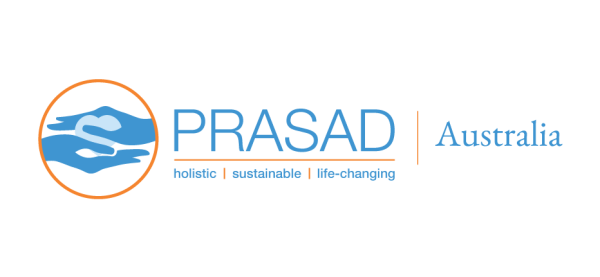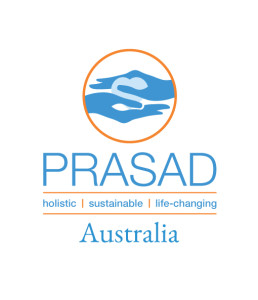
General Health Care Programs
Tansa Valley, India—PRASAD Chikitsa began delivering medical services through a mobile hospital in 1978.
Today, PRASAD runs a full-fledged hospital and diagnostic center, a modern eye-care clinic, a comprehensive dental care clinic and acclaimed TB and HIV/AIDS programs. These are supported by preventive and educational initiatives that are permanently improving the health and welfare of Tansa residents.
The Tansa Valley in Maharashtra, India is about 100 miles from Mumbai. Despite proximity to India’s financial capital, most of the 200,000 people in this predominantly tribal area have lived hand-to-mouth for generations. They work as farm laborers, in brick factories, and doing odd jobs, earning about $50 or less per month. Before PRASAD Chikitsa began offering programs in the Tansa Valley, most children in the area were malnourished; adults battled untreated tuberculosis and heart disease, and many endured lives of blindness caused by cataracts. The government-run Primary Health Care Centers and the few private clinics in the valley could not meet the needs of so many people.
Shree Muktananda Mobile Hospital
Started in 1978, the Shree Muktananda Mobile Hospital was one of PRASAD Chikitsa’s first health care initiatives in the Tansa Valley. The goal was to bring health care where it was needed most: to people in the remote and inaccessible reaches of the Tansa region.
After more than three decades and thousands of miles, the Shree Muktananda Mobile Hospital continues to serve the valley’s most isolated inhabitants, many of whom cannot afford the time or cost to travel to see a doctor.
Today, the mobile hospital remains a vital part of PRASAD Chikitsa’s health care system, making trips twice a week, and reaching 500-700 patients a month.
Gurudev Siddha Peeth Anukampaa Health Center
Since its opening in June 2003, the Anukampaa Health Center (AHC) has played a pivotal role in delivering health care to the people of the Tansa region. Today, the center treats 3,000 patients a month for a multitude of diseases and conditions. PRASAD Chikitsa provides treatment and medicines for nominal fees; services are free for those who can’t afford to pay.
The AHC’s General Outpatient Department is open six days a week. Visiting experts in surgery, cardiology, orthopedics and other fields provide specialized services including psychiatry, ultrasound, male health, cardiac care and audio-speech therapy.
The AHC is also home to PRASAD’s Tuberculosis Program. The disease accounts for more casualties than any other infectious disease in India, claiming a life every minute. Doctors at the Anukampaa Health Center have achieved a cure rate of 95 percent, surpassing the Indian government’s benchmark of 85 percent.
In 2010, the World Health Organization and the Indian government’s Revised National TB Control Program recognized the PRASAD Chikitsa program as a Designated Microscopy and Treatment Center.
PRASAD Chikitsa’s diagnostic center, which opened in 2001 and moved to the AHC in 2003, has evolved into a state-of-the-art facility that serves nearly 400 patients a month.
Eye Care Programs
Cataract-related blindness accounts for 80 percent of all visual impairments in India. Loss of vision can lead to complete financial and physical dependence, and it can affect personal relationships. PRASAD operates a 25-bed in-patient ward and an outpatient clinic with the latest eye care equipment. Doctors usually perform cataract surgery on an outpatient basis, and the in-patient ward is available to ensure that patients get the post-operative care they need for a full recovery.
Since 1990, PRASAD volunteers and staff have provided eye health screenings and treatment for more than 258,000 people through home visits, in-school screenings and mobile eye camps. PRASAD Chikitsa has been providing approximately 500 cataract surgeries each year.
PRASAD Chikitsa’s HIV/AIDS Programs
Currently, there are estimated to be 2.3 million HIV positive cases in India. As in other parts of the developing world, AIDS in India affects the most vulnerable and marginalized people. The Tansa Valley is particularly vulnerable to HIV/AIDS, as it has a large migratory workforce because of the industry in the region, and two major truck routes that traverse the valley.
PRASAD Chikitsa began HIV/AIDS awareness programs in the Tansa Valley in 2004. In 2005, we added medical services. As of late 2011, the award-winning programs had reached 78,589 people. More than 1,495 HIV-positive people are registered with PRASAD’s HIV/AIDS Program – an increase of 40 percent from 2009. That means more people are seeking treatment and curbing the spread of the disease. In 2009, the program’s staff hosted a training session attended by representatives from other India-based NGOs.
The objectives of PRASAD Chikitsa’s Comprehensive HIV/AIDS programs are to:
- create awareness about HIV/AIDS
- provide early diagnosis, treatment and support
- serve children whose lives have been affected by the disease
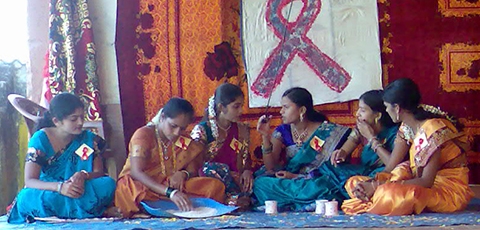 PRASAD Chikitsa social workers, volunteers and doctors hold up to four HIV/AIDS awareness trainings or meetings per day in villages and for students and high-risk groups like factory workers and rickshaw and truck drivers.
PRASAD Chikitsa social workers, volunteers and doctors hold up to four HIV/AIDS awareness trainings or meetings per day in villages and for students and high-risk groups like factory workers and rickshaw and truck drivers.
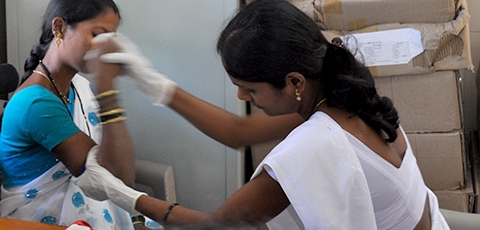 PRASAD Chikitsa’s Family Health Center (FHC) provides HIV testing and counseling for the children and adults in PRASAD’s service area. The Indian government has recognized the FHC as an Integrated Counseling and Testing Centre under Public/Private Partnership.
PRASAD Chikitsa’s Family Health Center (FHC) provides HIV testing and counseling for the children and adults in PRASAD’s service area. The Indian government has recognized the FHC as an Integrated Counseling and Testing Centre under Public/Private Partnership.
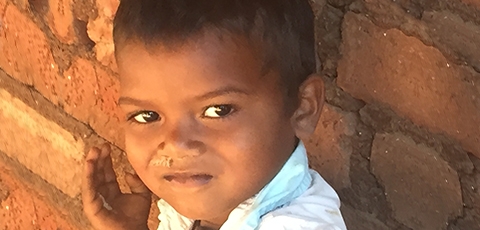 One of the most effective ways to combat HIV is to prevent pregnant women who are HIV-positive from passing the infection to their unborn children. In late 2004, PRASAD collaborated with public health centers in the Tansa Valley to establish the Prevention of Parent to Child Transmission Program (PPTCTP). The Prevention of Parent to Child Transmission Program (PPTCTP) gives free, prenatal screenings for HIV and other STDs to all pregnant women who give informed consent. We also provide antiretroviral therapy (ART) drugs to pregnant mothers infected with HIV. To date, all babies born to PPTCTP participants have been HIV-free. If in the future, any babies of HIV-positive patients are born infected, PRASAD Chikitsa will provide them with long-term drug therapy.
One of the most effective ways to combat HIV is to prevent pregnant women who are HIV-positive from passing the infection to their unborn children. In late 2004, PRASAD collaborated with public health centers in the Tansa Valley to establish the Prevention of Parent to Child Transmission Program (PPTCTP). The Prevention of Parent to Child Transmission Program (PPTCTP) gives free, prenatal screenings for HIV and other STDs to all pregnant women who give informed consent. We also provide antiretroviral therapy (ART) drugs to pregnant mothers infected with HIV. To date, all babies born to PPTCTP participants have been HIV-free. If in the future, any babies of HIV-positive patients are born infected, PRASAD Chikitsa will provide them with long-term drug therapy.
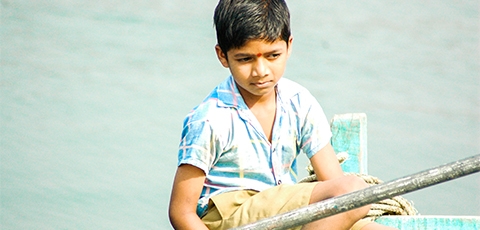 In partnership with the Indian government’s ART Centers, PRASAD Chikitsa makes sure that all HIV positive patients who need ART are receiving it. Patients also receive nutritional support, treatment of secondary infections and psycho/social/spiritual counseling. In 2010, the HIV program held over 9,500 counseling sessions.
In partnership with the Indian government’s ART Centers, PRASAD Chikitsa makes sure that all HIV positive patients who need ART are receiving it. Patients also receive nutritional support, treatment of secondary infections and psycho/social/spiritual counseling. In 2010, the HIV program held over 9,500 counseling sessions.
